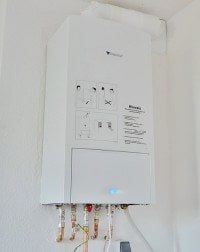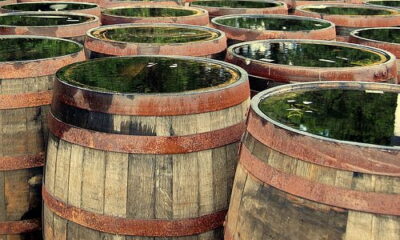

Energy
A Homeowners Guide To Green Boilers
These days, we are called to make changes that will allow us to live more sustainably. Since heating is one of the biggest energy users, it makes sense to transition toward more efficient heating systems. Green boilers are a great solution for those seeking to reduce their carbon footprint, and the options for green boilers are increasing all the time.
If you’re considering a green boiler for your home, there are a few things to think about before you make the transition. Let’s take a look at the various types of green boilers and how to choose the green boiler that’s right for you.
There are two main types of green boilers that both reduce environmental impact while meeting different consumer needs: biomass boilers and condensing boilers.
Exploring Biomass Boilers
Biomass boilers take us back to earlier times, when wood burning stoves and fireplaces were central to heating our homes. In fact, they operate in a similar way: by burning fuel (like logs or wood pellets). However, in the case of these earlier technologies, most of the heat goes out through the chimney. Modern wood burning stoves are actually quite efficient, with design improvements that convert more of the fuel into useable heat. For many modern wood burning stoves, you can attach a boiler to heat water and direct the heat to radiators throughout your home.
While biomass boilers do emit carbon dioxide by burning wood and other biomass, we can classify them as carbon-neutral systems of renewable energy, since the carbon dioxide emitted equals the amount absorbed by the plants while they grew. Compare this to oil or gas, which do not absorb carbon dioxide before they’re extracted, cost energy to extract, and then emit carbon dioxide while they’re burned.
Automatic biomass boilers control the amount of fuel and air that are sent to the combustion chamber, making automatic biomass boilers optimally efficient. But for any biomass boiler, two things are needed: space and fuel. Rural dwellers often have the space to store a big biomass boiler and the stacks of logs needed to keep it running; they also often have access to free fuel (trees) that they can obtain themselves. For those living in smaller spaces or in the city, getting and storing wood logs can be more difficult, and importing wood chips is not a highly sustainable practice. This brings us to the second main type of boiler.
 Condensing Boilers: The Modern Marvel
Condensing Boilers: The Modern Marvel
Since 2007, all gas boilers installed in England and Wales must be condensing boilers by law. But even if your old gas boiler doesn’t need to be replaced, there are still reasons to consider switching to a condensing boiler.
As opposed to biomass boilers, condensing boilers are fuelled by oil or gas. So why are they energy-efficient? Condensing boilers use waste heat that’s released from the initial burning process to preheat cold water entering the boiler. During combustion, water vapour is condensed into liquid, recovering this heat to make the whole process more efficient.
The efficiency of condensing boilers can be up to 28% greater than standard boilers, making this transition an effective one. The extra heat exchanger in condensing boilers allow for greater efficiency without sacrificing space for biomass storage. They require little interaction from the user beyond regular maintenance, and there are various sizes to accommodate different households.
Making the Switch
There’s no doubt that green boilers save energy and have a smaller environmental footprint than older boilers. Like many eco-friendly systems, they also save homeowners money, using less (and often cheaper) resources. But are these savings enough to make up for the investment that comes with switching to a new boiler?
Consider your resources, your surrounding home environment, and your needs. Do you have access to biomass and storage? Do you have a system than can be converted into a condensing boiler for more efficiency?
Once you know what type of boiler will suit your needs, research local and regional boiler installers to compare costs and benefits associated with each. With a few calculations, it will be easy to see that investing in a green boiler will not only pay you back but will help reduce your carbon footprint along the way.
About the Author: Lee Kelly is the owner of Ambient Heating & Plumbing in Bristol. He has been qualified for over 13 years and in that time has helped many homeowners and landlords with their plumbing, boiler and gas safety checks. You can connect with Lee on Google+, Facebook and LinkedIn or call Ambient Heating & Plumbing on 01179 619 021.






























